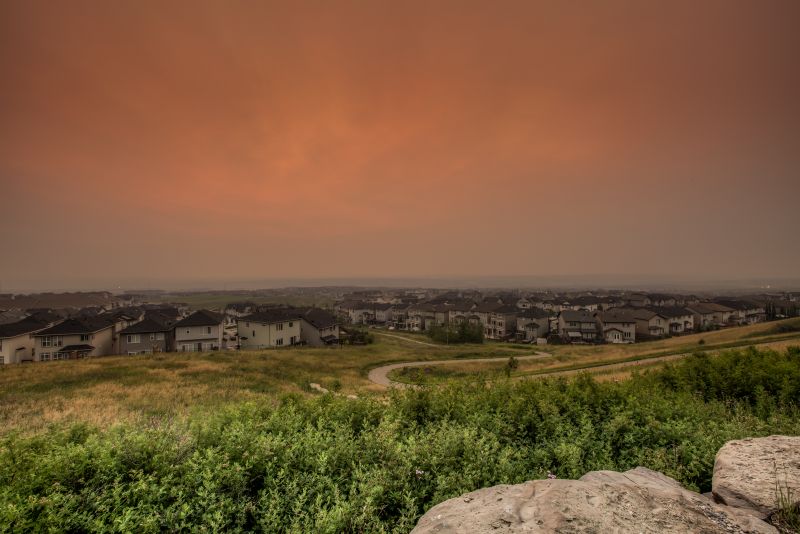A significant improvement in the air quality in Calgary prompted Environment Canada to end its special air quality statement for the city on Tuesday morning.

As of Tuesday at 5 a.m., Alberta Environment and Parks listed Calgary’s Air Quality Health Index (AQHI) at 2 (low risk) – that’s down from 7, or high risk on Monday.
The AQHI relating to smoke from a forest fire is based on the amount of particulate in the air and its potential effect on people in a particular area.
Smoke from forest fires near Banff National Park and in central British Columbia prompted Environment Canada to issue an air quality advisory for Calgary on Sunday.
The advisory cautioned smoke is causing poor air quality and reducing visibility.
READ MORE: Areas of Kootenay and Banff national parks closed due to wildfire

AHS Medical Health Officer for the Calgary zone David Strong said Monday that air quality could remain compromised across the province for the next week or so.
“There’s no predicting where that smoke is going to go to, so all the zones basically have issued a similar kind of advisory,” Strong said. “I think right now the Calgary area has got the worst in terms of air quality, but it’s going to fluctuate. Different parts of the province are going to have issues, perhaps, over the next week.
“We’re not that close to the fires in B.C., so I don’t anticipate us having really severe air quality issues, but it’s hard to predict what’s going to happen.”

Get breaking National news
Environment Canada said Tuesday smoke from B.C. fires will likely worsen air quality again on Wednesday, with the thickest smoke between Red Deer, Edmonton and Hinton. The AQHI for those areas is forecast to hit between 8 and 9, or high risk for Wednesday.
In Calgary the AQHI is expected to hit 6, or moderate.
Precautions to take amid potential health concerns
Environment Canada warned residents in Calgary and visitors to the city may experience symptoms such as increased coughing, throat irritation, headaches or shortness of breath due to the smoke. Children, seniors, and those with cardiovascular or lung disease, such as asthma, are especially at risk.
According to the AHS website, when an air quality advisory is in effect, all individuals living in or travelling within the affected area are advised to take the following precautions to reduce exposure and risk:
- Calgary family uses billboard in plea to find a kidney donor
- Tumbler Ridge school shooting victim set to hopefully return home soon from Vancouver hospital
- Alberta government announces purchase of new waterbombers to fight wildfires
- Edmonton police seek public help on investigation into fatal shooting
- If air quality is because of smoke reduce presence of smoke in indoor environments:
- Close and lock all outside windows and doors, including attached garage doors.
- Turn down furnace thermostats and furnace fans to the minimum setting. Do not attempt to extinguish pilot light.
- If you have an air-conditioner, keep the fresh-air intake closed and the filter clean to prevent outdoor smoke from getting inside.
- Avoid running fans, such as “whole-house fans” or “fresh air ventilation systems”, that bring more smoky outdoor air inside.
- Switch all floor registers to closed position.
- Close fire place dampers on wood burning fireplaces.
- Do not use wood burning fireplace, wood stoves or other smoke-producing appliances or features, including candles.
- If you must drive to another location, keep windows and vents closed. Run car fans on re-circulate mode to avoid drawing in outdoor air.
- Reduce levels of physical activity, as necessary, to decrease the inhalation of airborne pollutants.
- Do not smoke tobacco – smoking puts added stress on your lungs and those around you.
- Residents are reminded not to use backyard fire pits or fire boxes in parks when the air quality risk is high or very high, as it is now.
Individuals with respiratory conditions (such as COPD and asthma), and individuals with existing cardiovascular conditions (such as angina, previous heart attack and congestive heart failure), may notice a worsening of symptoms. These individuals should take the precautions routinely recommended by their physicians if a worsening of symptoms occurs.
Children and elderly are also at higher risk of smoke-related illness.
Summer camp concerns
Organizations running summer camps in the city have been paying close attention to air quality.
At the University of Calgary, there are 1,500 kids registered for day camps this week, and officials had to change some morning sessions on Monday to limit exposure to the smoky conditions.
Logan Jones, youth programs manager with the U of C said camp leaders are able to make changes on the fly, and can bring children inside if the air quality gets too bad.
“Every day it will be monitored. We’ll check the air quality health index as well to see what the forecast is. That helps us with our planning a little bit,” Jones said.
“Some of the activities like the soccer and golf, they would be moved to more indoor settings if possible, and they would do some dryland activities.”
More information
For up-to-date information on the air quality across the province, visit Alberta Health’s website.
Individuals experiencing symptoms can also call Health Link at 811 to speak to a registered nurse.
To see a radar map of the smoke forecast, visit Alberta Wildfire’s website.
Want your weather on the go? Download the Global News Skytracker weather app for IOS and Android.
– With files from Melissa Gilligan and Erika Tucker








Comments
Want to discuss? Please read our Commenting Policy first.